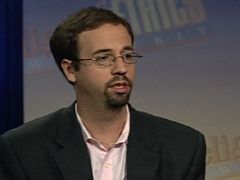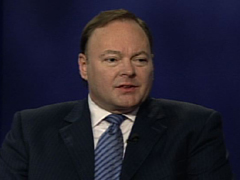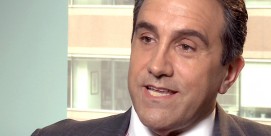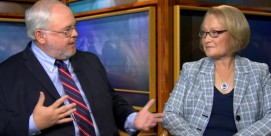In This Episode << SLIDE LEFT TO SEE ADDITIONAL SEGMENTS
Religion and the Courts
DEBORAH POTTER, guest anchor: As we mentioned earlier, another presidential nominee is in the spotlight this week, Sonia Sotomayor. The news of her nomination to the Supreme Court has dominated headlines, along with the California Supreme Court’s decision to uphold a ban on same-sex marriages. Joining us now to discuss those stories are Dan Gilgoff, senior writer at U.S. News & World Report, and Tod Lindberg, research fellow at the Hoover Institution. Welcome to both of you. Dan, you’ve described the nominee’s record on abortion as “inscrutable.” What do we know about her record on that particular issue?
DAN GILGOFF (Senior Writer, U.S. News & World Report): Not much. She’s ruled on a handful of cases related to abortion, but none of them directly related to Roe v. Wade. The one case that some in the pro-life community are citing as a hopeful sign for their cause is that she ruled against plaintiffs who are seeking to overturn the Mexico City policy, which bans federal funds from going to family-planning providers abroad that either endorse or promote abortion. Other than that she seems to be, you know, a black box on this issue, which is kind of fitting, because David Souter, the justice who she’s replacing, was also promised to be a conservative when George H.W. Bush appointed him to the Court in 1990, then of course voted to uphold Roe v. Wade a couple of years later. And so what’s happening this week is that some abortion rights groups are getting rather nervous. That’s kind of unexpected.
POTTER: Well, Tod, is this actually good news for conservatives who may have been concerned that the president would nominate a true liberal to the Court?
TOD LINDBERG (Research Fellow, Hoover Institution, Washington, DC): Well, I think that it’s still very much up in the air. It’s hard to see at this point. We all know that people who are hoping to be nominated to the Supreme Court are very cautious about what they say in their private lives and in their public writings, apart from what they are doing on the bench with regard to the abortion issue. I know people who aspire to be judges who would tell you, “I would absolutely never discuss that with you” for that precise reason. You want to be opaque, because if you have a position, I mean a discernable position, then you put yourself at substantially greater political risk. It’s kind of kabuki drama in its own way, but it’s one that we’ve been playing in Washington for a long time.
POTTER: And yet Hispanic voters traditionally are sort of much more anti-abortion than the rest of, say, the Democratic electorate. Is that — does that give you any clues, that fact that she’s Hispanic?
Mr. LINDBERG: You know, you’re talking about making a conclusion based on statistical evidence, polling, etc. and applying it to a particular person. It’s just not going to work for us. We’re not going to be able to know that. The test will be once she’s confirmed, and I think everybody assumes that she will be, when the cases arrive.
POTTER: Dan, what do we know about her record on issues of religious freedom, separation of church and state — other issues that really matter to voters of faith groups?
Mr. GILGOFF: Well, we know that she has a record of siding with those who are alleging violations of their religious liberty. And I think that’s been another bright spot for conservatives. It’s interesting in that conservatives came out roundly against her as soon as her nomination was announced this week, and at the same time, I mean, in the analysis that they were releasing before Obama made his choice, she kind of received the warmest treatment. And I think some of that was because of her rulings over the religious liberty cases.
Mr. LINDBERG: I think you’d also have to draw the distinction between the conservative commentary crowd and actually the members of the Senate, who have taken a very cautious view of this. I mean they promised, the Republicans promised full scrutiny, full assessment, but certainly no one has leapt out to be an opposition figure. Certainly no one has said this nominee is unacceptable where it really matters, which is in the Senate.
POTTER: So the presumption at this point is that she will be confirmed?
Mr. LINDBERG: I think the presumption is exactly that, in the absence of some unknown, unexpected revelation or disclosure.
POTTER: And that would leave us with six justices out of the nine being Catholics for the very first time. Is that important? Does that have significance?
Mr. GILGOFF: I think that it really speaks to the diversity ideologically of the Catholic community in this country. I mean, you talk as though, or people talk as though there’s a Catholic voting bloc, for instance. But Catholics really have voted for every winning president going back to Richard Nixon, and so it’s hard to see them — you know, they’re conservative Catholics and liberal Catholics — as a distinct bloc. But so far on the Court they’ve supplied the conservative side — the [five] Catholics are voting with the conservatives on the Court. So what I think this will do is kind of reflect more broadly the Catholic diversity that exists in the country on the Court. I also think it tells us something important about the administration politically in that they’ve taken the Catholic community very seriously. This is really a nod — Sotomayor — to the new Latino complexion of the United States. I mean, the Catholic Church is losing, you know, four Catholics for every person that’s signing up for the Church, and if it wasn’t for this huge infusion of immigration, the Church would have a real problem on its hands, and I think they’re really acknowledging that in this pick.
Mr. LINDBERG: I think the conclusion that we have to draw from this six-out-of-nine thing is that Catholic is always a plus in terms of your political calculation of who you are going to put on the Court.
POTTER: Now, let’s talk a little bit about the ruling in California that upheld a ban on same-sex marriage there.The Republicans, I gather, put out some talking points this week on Sotomayor, and one of their talking points was that she could impose a federal right to same-sex marriage. Does that have the chance of holding water, that argument, or no?
Mr. GILGOFF: I don’t think so, and I also think that the timing of this is actually very serendipitous for the White House. There was even some speculation that the White House expedited the announcement of Sotomayor to get ahead of the California Supreme Court ruling, because had the California Supreme Court struck down Proposition 8 you would have had this conservative uproar, largely directed at the Court, saying this is really the threat. The threat is that there will be Court-imposed same-sex marriage.
POTTER: Activist judges?
Mr. GILGOFF: Exactly. And so I think that the California Supreme Court ruling was really a lucky break for the Obama Administration in getting, you know, in sort of clearing a path for Sotomayor.
POTTER: What do you make of the next steps for the opponents of same-sex marriage? What do they do now? Where is their next step?
Mr. LINDBERG: Well, you know, I think there will be a continuation of initiative kind of processes. It is also interesting to look at what, you know, the next steps for the proponents are going to be. I think there’s a pretty strong indication that they do not want this matter, really, in the federal courts at this point. They would rather spend some time building up a case both politically and in terms of kind of the state court rulings that they’re able to obtain with the hope that California is more of an outlier than an indication of the trend, and take that then eventually into the federal courts. So I think, you know, conservatives will be looking to try to win in state courts where possible to show, however strongly, you know, the emotions run on this issue, that there is a principled case for defense of marriage as between a man and a woman, and that that is where most of the American people are.
POTTER: Are the statutes in the 29 states that have already banned same-sex marriage basically safe, because you’d have to go after them through some kind of referendum process, which is really hard to do?
Mr. LINDBERG: Well, safe is — no. I mean, I think if there’s ever a majority on the Supreme Court that wants to change the law on this then those statutes are precisely not safe, and I think that everybody’s aware of that and what the stakes are. But, you know, what I don’t see is a quick resolution of this issue. I think it’s one that unfolds over possibly ten years or maybe longer.
POTTER: Alright, thank you both very much. Thank you to Tod and thank you to Dan for joining us for that conversation.









